With today’s average customer online and connected, every individual has a voice and a platform to share their experiences and opinions of the businesses they engage with — and these perspectives matter.
In fact, 86 percent of consumers report reading reviews for local businesses and most read up to 10 reviews before trusting a local business.
No two customers perceive an experience the same way and some customers are rarely, if ever, completely satisfied with a product or service. For example, here are some hilarious negative reviews that make us understand (and appreciate) why reviews can be updated:
- “It’s a great beach, just too sandy.” (source)
- “Whoopity do, Grand Canyon. You are a giant hole in the ground.” (source)
In a world where people are appalled by a sandy beach or a hole in the ground that grossly misrepresented itself as a Grand Canyon, how can brands and businesses stand to compete for their five-star reviews? In this article, we cover customer service best practices for managing negative reviews from start to resolution.
Should You Respond To Reviews?
Can you respond to Google and Yelp reviews? Yes.
Should you respond to Google and Yelp reviews? Yes.
We discussed earlier how many customers take the time to read reviews, but an even more important statistic to consider is that 89 percent of consumers read business replies to reviews.
Your response is a way to communicate with current and future customers how much value your company places on great customer service. Let’s start by discussing some of the top review management platforms and what to look out for regarding your business.
Yelp Reviews and Ratings
Yelp! A platform for connecting customers with the best businesses in town that’s also a place for customers to rate the best (and worst) businesses in town. Unfortunately, a bad experience and subsequent review can come from any interaction, no matter how brief.
If a customer calls your business and senses a sharp tone over the phone, they can rate and review you for that. If a customer has a water heater that no longer works but doesn’t want to incur the cost to replace, they can negatively review you for not being able to fix the unfixable.
Reviews and ratings are important factors that Yelp considers for organizing search results on their site. Just like Google has algorithms for ranking search results and the App Store has ranking factors for featured apps, Yelp has its own ranking algorithm with factors that include:
- The number of reviews
- Average rating
- Reviewer credibility
Unfortunately for new businesses, Yelp also allows users to filter results by highest rated, most reviewed, and other factors that can greatly limit your exposure on Yelp. This is why it’s vitally important that business owners in service industries are visibly dedicated to great customer service on Yelp.
Google My Business Reviews
Let’s face it, most people search for your business on Google.
In fact, the search “plumber near me” is queried 62,000 times every month. This emphasizes how important it is to build and maintain a presence with these potential customers online.
Google My Business allows you to verify your business, update relevant information, engage with customers, and more.
When Should You Remove Negative Reviews?
In some cases, it’s best not to respond to negative reviews. Companies like Google, Yelp, Facebook, and others reserve the right to remove fake, abusive, inappropriate, or inaccurate content.
Let’s cover some basic examples of when reviews could violate a platform’s rating policy.
Conflict of Interest
If you suspect a review was written by a competitor and not an actual customer, you can flag the review for Google, Yelp, or others to consider removing.
This conflict of interest not only applies to shady competitive tactics but also reviews by disgruntled former employees. And we probably don’t have to tell you this, but don’t give your own business a review — no matter how glowing your review is.
Fake, Inaccurate, or Off-Topic
Fake, inaccurate, or unrelated rants are also ripe subjects for removal.
If you believe a review is fake or inaccurate, it’s best to take the steps to formally remove the review as outlined by the platform. Many businesses we see will reply to these reviews with a “you must have the wrong business” defense, which if not removed, can look like a dishonest attempt to deflect negative feedback.
Abusive Content
Content that could be considered offensive or derogatory can also be flagged for removal.
If a customer attacks an employee personally or makes slanderous accusations about the integrity of your business, it could be enough to warrant removal. If the customer uses inappropriate or threatening language, their review could be algorithmically removed, but if not, flag for removal and do not respond.
In addition to the aforementioned, there are other grounds for review removal, including dangerous, illegal, and terrorist content.
7 Tips For Responding To Negative Reviews
Sometimes, negative reviews are the result of an abnormal experience with the business or a particularly hard-to-please customer, but more often, they signal a much larger issue. This is because most customers will not complain, they will simply never return and most definitely will not refer your company.
They say the squeaky wheel gets the grease, but when it comes to responding to negative reviews, the metaphorical grease can trickle down to the other wheels. Future customers see and appreciate your dedication to relieving customer concerns and solving problems.
It’s well worth your time to respond to and resolve any pending customer complaints, so we cover the basics below.
1. Acknowledge the Issue and Apologize
First, let’s not beat around the bush. Unless you own a landscaping business, then still, don’t beat around the bush.
Reiterate the customer’s problem so they know you understand what exactly transpired. Follow your summary with a formal apology.
You don’t always need to take the blame as if the customer’s reaction to the experience was entirely your fault, but you should give an honest apology for how it made the customer feel.
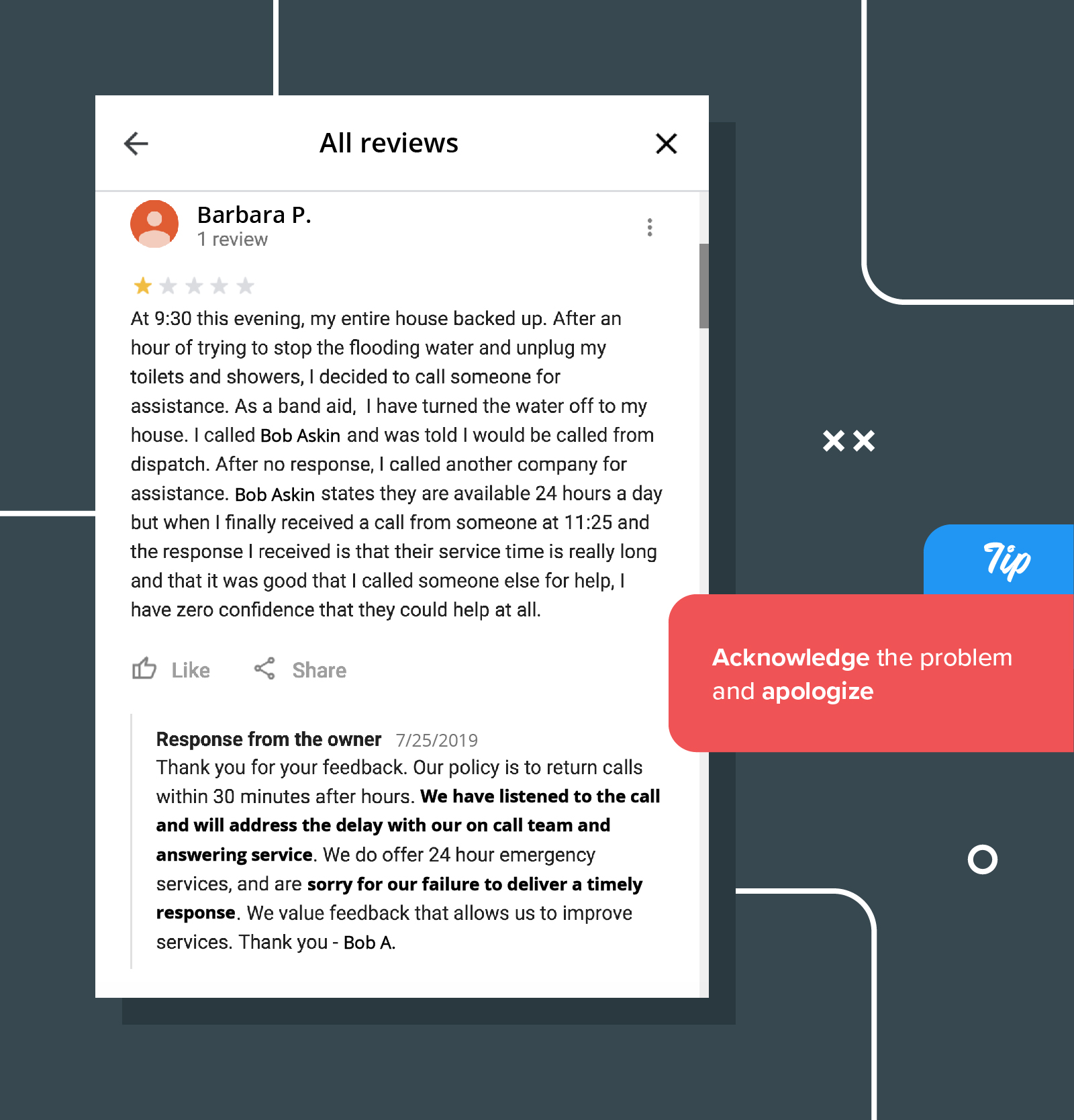
In this example, the owner offers thanks to the customer for their feedback and proceeds to explain their after-hours policy, acknowledged the call was missed, and outlined their steps to address the situation. They also apologize for failing to respond in a timely manner.
2. Empathize With the Customer
“People don’t care how much you know until they know how much you care.” – Theodore Roosevelt
Before you propose a solution, connect with the customer’s sense of compassion. Show them that you genuinely care about their feelings, not only because your business interests align with their satisfaction, but because you understand what it’s like to be in their shoes — textbook empathy.
3. Avoid Confrontation Online
If an eye for an eye would make the whole world blind, would a Yelp for a Yelp make the whole business world unwind?
It’s easy to take personal offense to negative feedback about your business — it is your livelihood, after all, and negative reviews can jeopardize that. Instead of replying to negative reviews in the heat of the moment, step back, take a deep breath, and don’t let your emotions dictate your response.
A defensive response can not only worsen the situation for the current customer but also signal how you respond under the pressure of criticism to future customers.
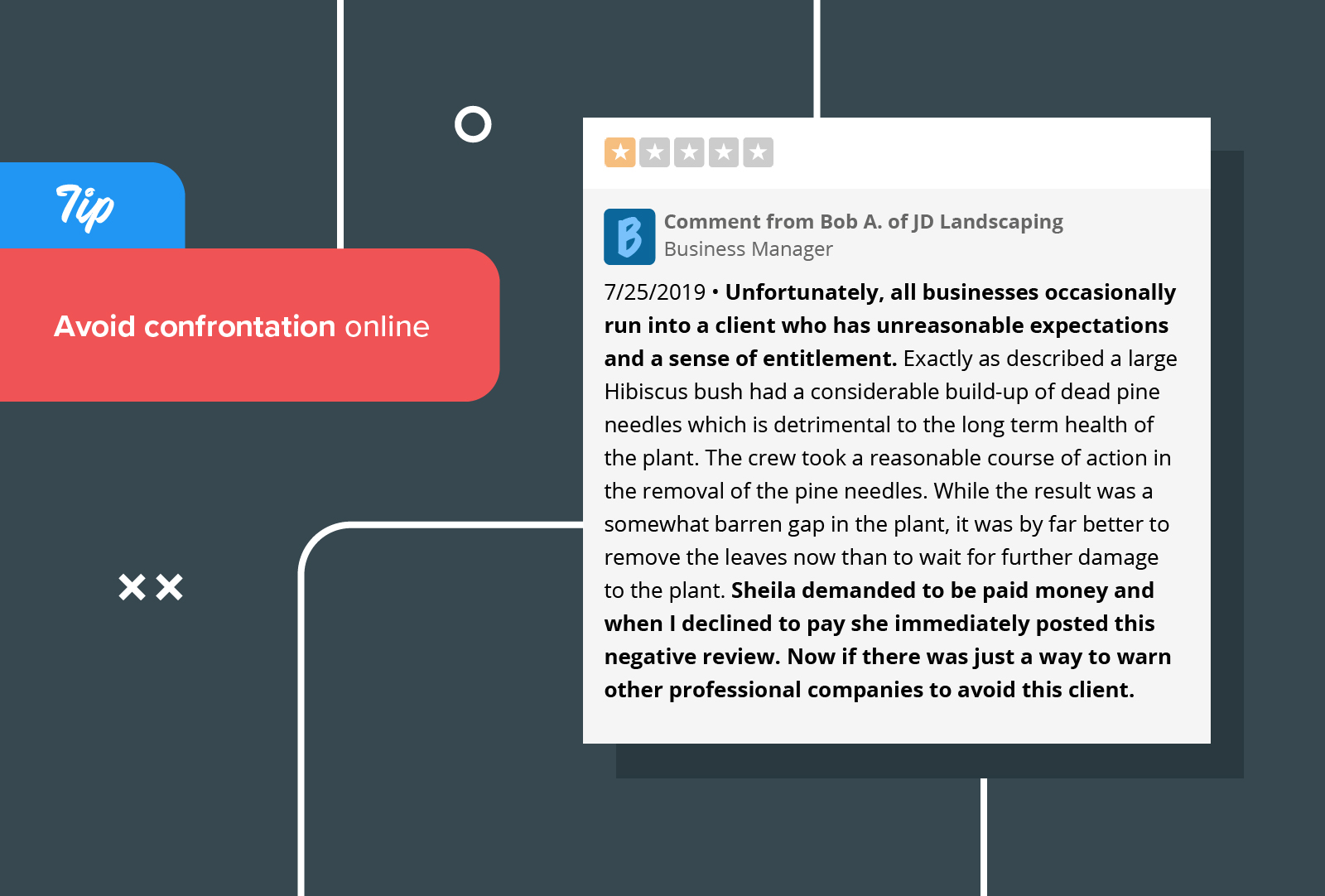
In this example, the owner describes how unfortunate it was to have worked with a client that has a “sense of entitlement,” which is an attack on the customer’s personality.
The owner goes on: “Now if there was just a way to warn other professional companies to avoid this client.” As a business owner, you must understand that this is a platform for customers to learn about your business, not the place for professionals that this owner craves, so including a comment like this only highlights the negative traits of your customer service.
4. Provide Contact Info For Offline Support
We do not advise you to ever become confrontational with customers, but if things do get heated, it’s best for it to happen out of the public eye.
It’s important that you provide a number or email address for customers to reach you directly, versus simply asking them to “reach out” or “give us a call.” If you, the owner, give your personal email address or number, it will signal how important customer service is to you.
5. Take Steps to Remedy the Situation
If no action is taken offline, work to make things right on the review management platform. In addition to your acknowledgment, apology, and empathy, make an offer to win back the customer’s goodwill.
In many cases, the offer is simply a gesture of good intentions. Not only does this boost the customer’s opinion of your business, but it also signals your dedication to resolving complaints and providing great service to future customers. This can be a useful strategy but must be navigated carefully to not appear as bribery for an updated review.
In the example above, the owner explains their policy, acknowledges the issue, and apologizes, but also makes a generous offer. The owner also specifically explains that the offer is not a ploy to up-sell the customer down the road, but an act of good faith.
6. Respond to Reviews with Gratitude
Whether or not the customer updates their review to reflect the situation’s resolution, respond to their review with gratitude.
Thank them for letting you work to make things right. Instead of using the platform as a soapbox to tell everyone of the extent to which you went to find a solution, simply thank them for the opportunity.
Ultimately you want to end on a positive note. Their last memory of your business will be that of a cordial thank you, which could retain their business in the future.
In the example above, the owner expresses his gratitude for the customer’s time and attention in reaching a resolution. This professional, appreciative, and genuine approach leaves a powerful impression on customers, both current and future.
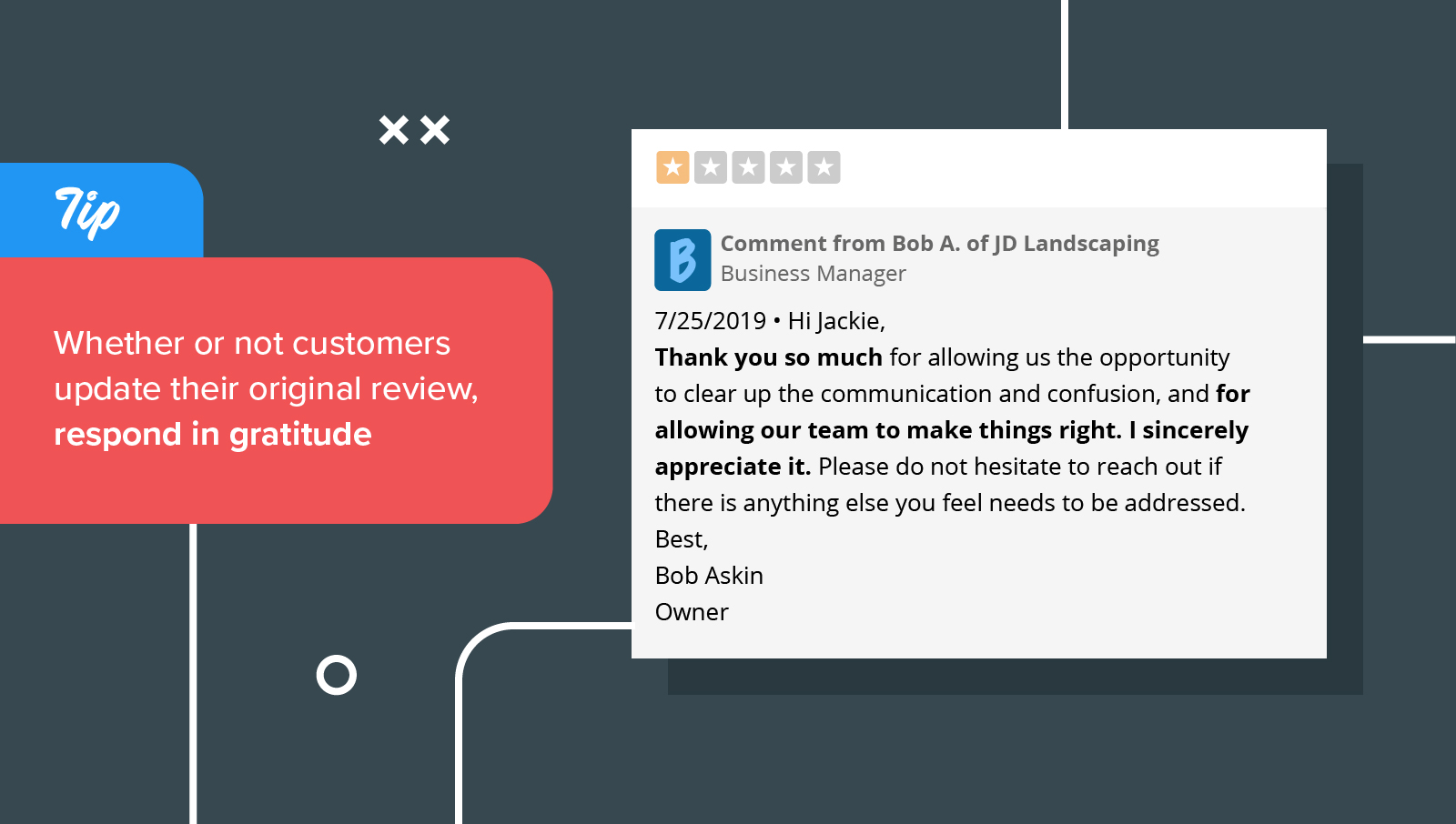
7. Update Your Response with a Status
Whether you’re attempting to resolve or have resolved the customer’s issue, including the status of the complaint at the top of your reply is a simple yet effective way to promote your customer service efforts.
Future customers will be able to recognize your efforts to resolve negative reviews without having to dig into the details of each negative review. At a glance, they’ll see that their complaints won’t go unrecognized.
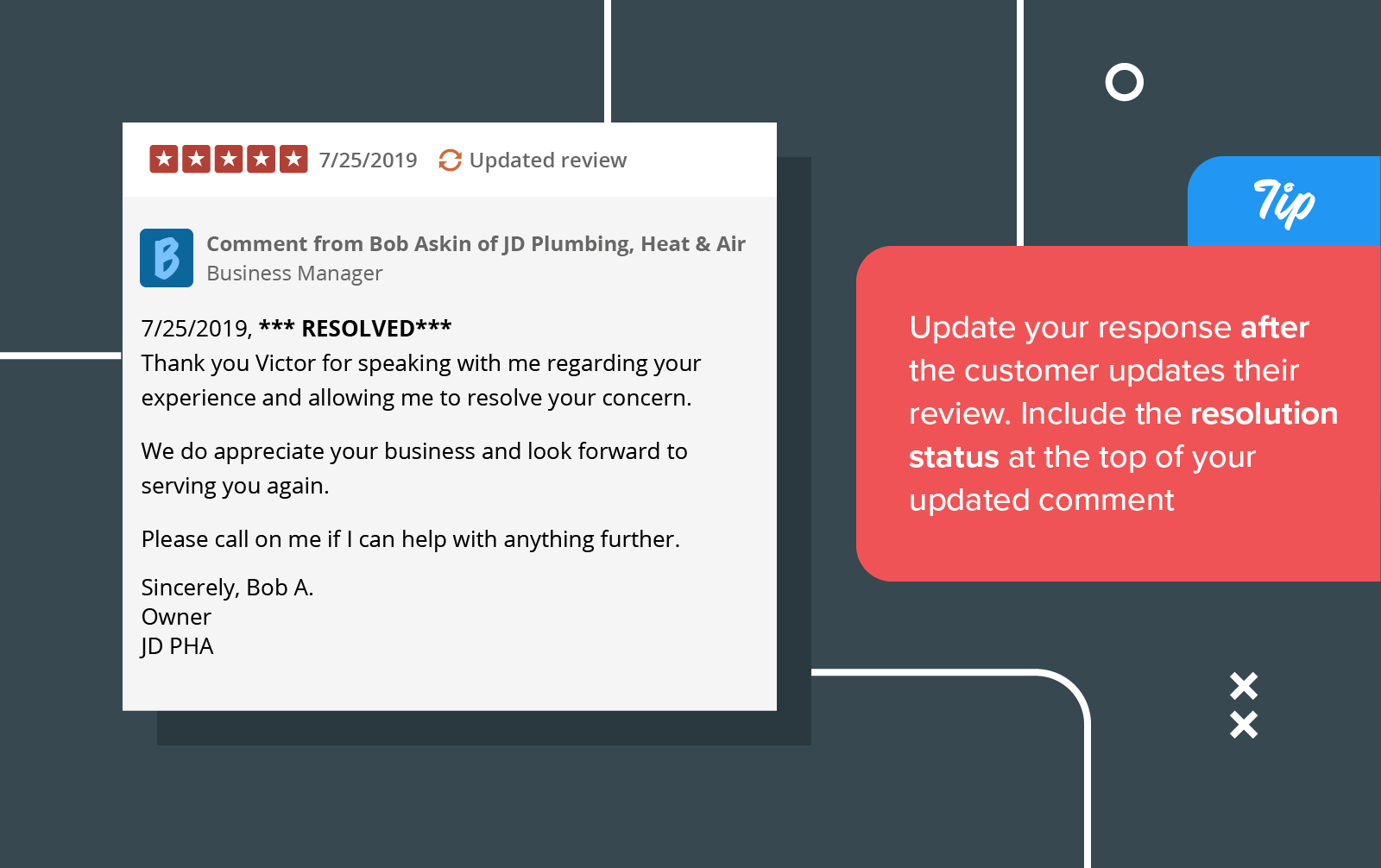
In this example, the company emboldens the status and surrounds it with stars. It’s easy to scan and understand that the business has resolved the issue, appreciates the customer, and opens up communication for the future.
Template For Responding to Negative Reviews
When responding to negative reviews, you can customize the template that meets many of the tips outlined above.
You will want to address the customer by name, thank them for taking the time to bring the issue to light, acknowledge the issue with empathy, provide information for additional support, offer a potential remedy, and put a personal salutation.
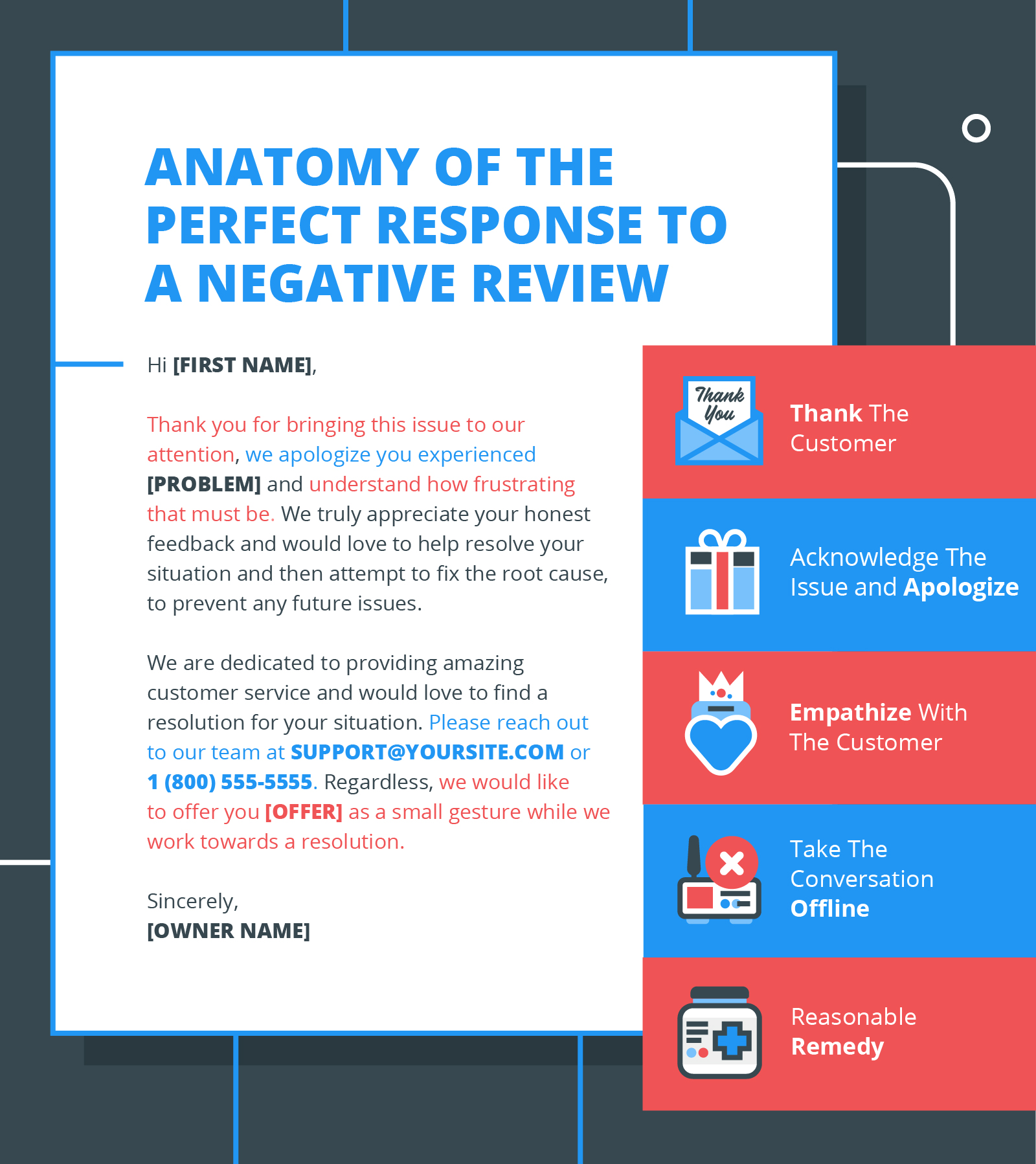
Whether or not the customer updates their review, as the business owner you should take the time to update the status. Updating the status, whether “attempted resolution” or “resolution,” it’s a great way to highlight your customer service to current and future customers.
This update should include a few key components, including:
- The resolution status
- Detailed description of what action was taken towards resolution
- Any laudable customer service measures
- The customer addressed by first name
- Personalized salutation
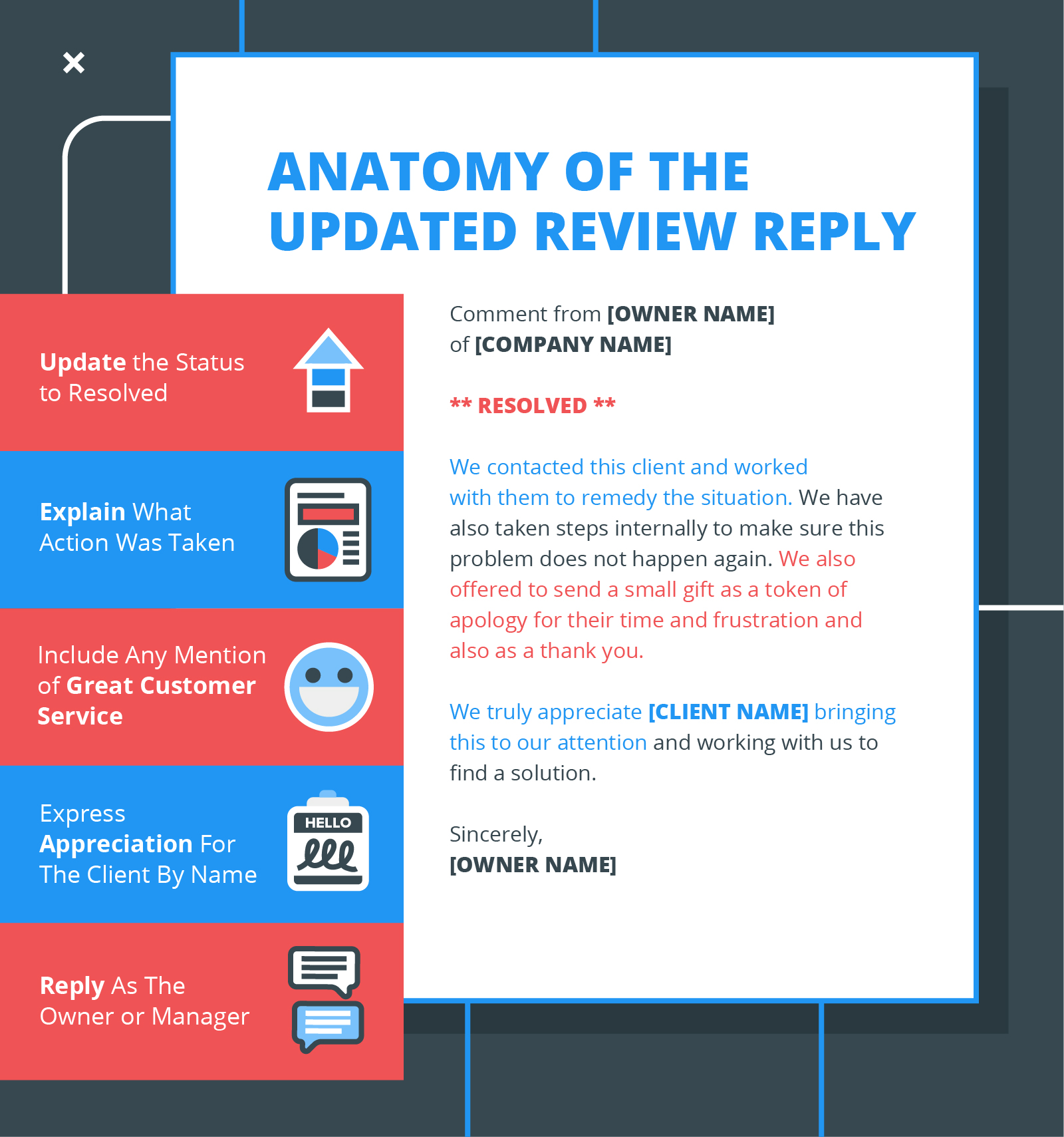
Tips for Responding to Positive Reviews
Can you imagine a stage performer who only conducts a meet and greet with people who disliked their performance?
You must engage your fans.
When customers take the time to leave a review, you should make the effort to reciprocate the appreciation. It can be easy to grease the squeaky wheels, but good maintenance goes a long way — if you keep all wheels well-greased, you shouldn’t have the problem in the first place.
Responding to positive reviews can be a great way to incentivize more of them. People love positive recognition, and showering them with recognition is a great way to turn happy customers into advocates for your business.
1. Thank Your Fans!
Take the time to show gratitude for your biggest supporters. Need we say more?
2. Highlight Another Perk
If your customer commented on how quick, easy, and fair your quotation process is, also ask if they’re aware of your extended warranty or another perk.
This is a great way to retain these customers moving forward, as well as provide organic marketing to the 89% of people who read business replies to reviews.
3. Promote Your Referral Program
If you have a referral program, positive reviewers are the people you want referrals from.
Although your true fans will advocate on your behalf without any incentives, a direct ask for referrals or a nudge in the right direction is an effective tool for building new referral business.
Respond to Your Reviews!
By now, you’re probably heading towards a new browser window to open your Google My Business or Yelp for Business account dashboard to start replying — good idea.
It’s important to make these replies a standard operating procedure for your business moving forward. Handle customer complaints and thank your fans in a timely manner.
If you’re concerned that this will be too time-consuming to benefit your business, consider using Housecall Pro’s review automation feature. With Housecall Pro, you can automate the review generation process and segment your best customers for targeted review requests.
Housecall Pro is a digital toolbox for field service professionals to operate more efficiently through the automation of administrative work. Learn more and start your free trial now!

This article originally appeared on the Housecall Pro blog; reprinted with permission.








